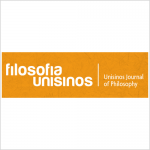A neo-communitarian approach on human rights as a cosmopolitan imperative in East AsiaAkihiko Morita
Vol 13, No 3 (2012) • Filosofia Unisinos - Unisinos Journal of Philosophy
Autor: Akihiko Morita
Resumo:
n my view, human rights must find an appropriate philosophical foundation/justification to be incorporated into non-Western societies and such a foundation/justification must be attractive and inspiring for ordinary citizens in those societies and be based on their own intellectual resources, including local languages. In contemporary Japan, ‘KEN RI (??)’ is considered as the Japanese term corresponding to human rights. However, Fukuzawa Yukichi, the most influential intellectual leader of the early Meiji period, introduced human rights as ‘KEN RI TSUU GI (????)’. The Chinese character ‘KEN (?)’, in the most fundamental text of Confucianism, the teachings of Confucius (551-479 B.C.), Analects, means being able to weigh occurring events and determine the application of principles to them. In the account of Tomonobu Imamichi, a Japanese philosopher, ‘GI (?)’, usually considered as justice, originally meant responsibility. Thus, ‘KEN RI TSUU GI (????)’ can be reinterpreted as being able to practically apply principles (?) to those events, while assuming responsibility (?) before Heaven and the community to which the person belongs. This view of humans as being embedded in communities and as centers of responsibility in the secular and transcendental dimensions is apparently different from the Western philosophical view of humans as rational beings with the capacity to act according to the universal law, but still defends human rights and the democratic development of society.
ISSN: ISSN: 1984-8234
Texto Completo: http://revistas.unisinos.br/index.php/filosofia/article/view/fsu.2012.133.01
Palavras-Chave: human rights,philosophical foundation,Confuc

Filosofia Unisinos - Unisinos Journal of Philosophy
The journal Filosofia Unisinos - Unisinos Journal of Philosophy is published once every four months by Universidade do Vale do Rio dos Sinos.
Articles must be original, unpublished, and not under consideration for publication anywhere else and can be written in Portuguese, English or Spanish
Filosofia Unisinos - Unisinos Journal of Philosophy prints articles, translations and critical book reviews. It also reprints papers that are considered fundamental to the area when authorized written permission is given by the original publisher.
